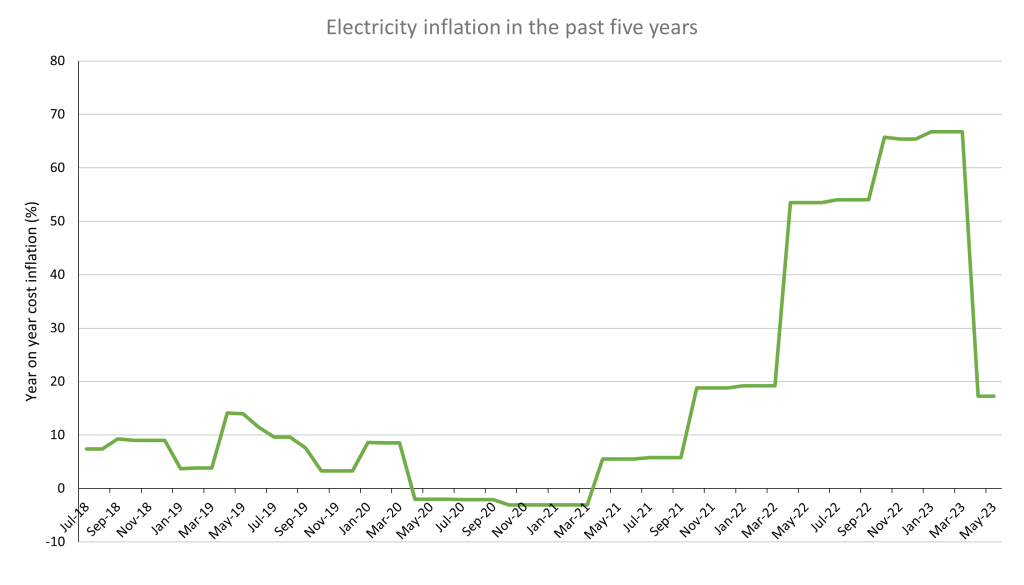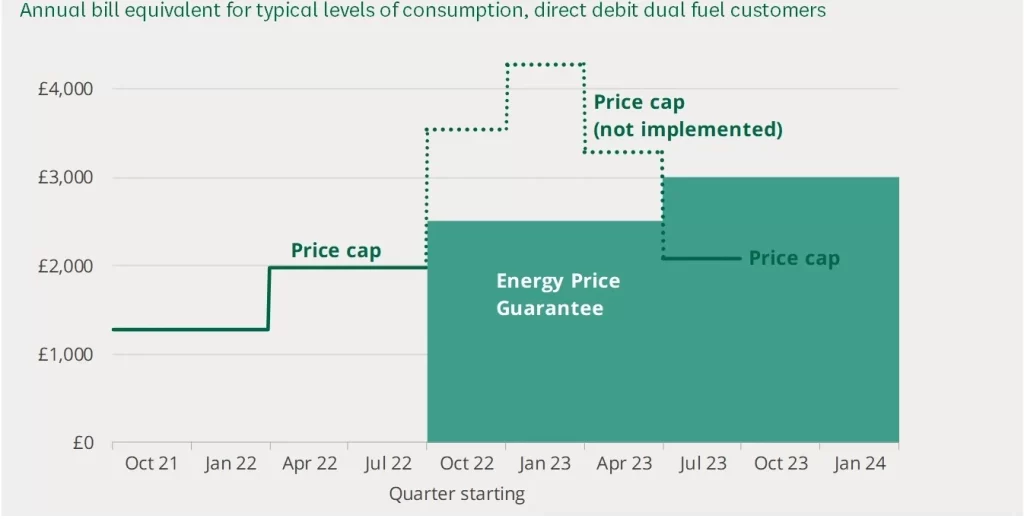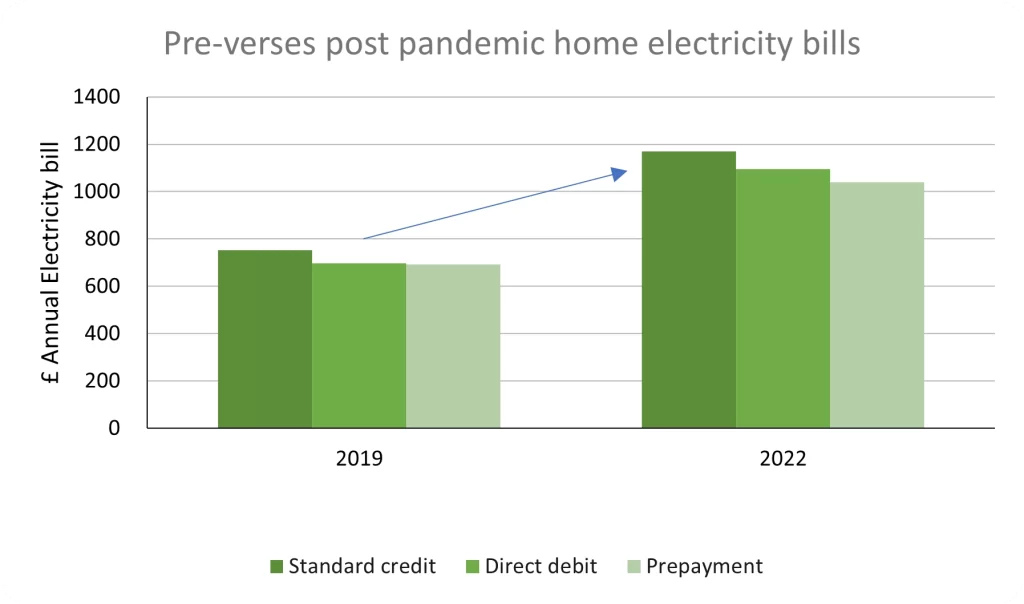Historical prices of electricity in the UK
Below is a summary of the average electricity bills in the UK since 2010. The data has been extracted from the Government’s annual domestic energy price statistics. The figures below assume an average household electricity consumption of 3,600 kWh, including VAT.
| Year | Standard credit | Direct debit | Prepayment meter | Overall average |
|---|
| 2010 | £470 | £431 | £481 | £451 |
| 2011 | £509 | £469 | £517 | £489 |
| 2012 | £539 | £497 | £541 | £516 |
| 2013 | £574 | £531 | £577 | £550 |
| 2014 | £589 | £542 | £593 | £564 |
| 2015 | £585 | £531 | £588 | £555 |
| 2016 | £595 | £533 | £594 | £558 |
| 2017 | £642 | £576 | £592 | £593 |
| 2018 | £695 | £628 | £621 | £641 |
| 2019 | £753 | £682 | £699 | £698 |
| 2020 | £755 | £688 | £721 | £705 |
| 2021 | £821 | £754 | £779 | £769 |
| 2022 | £1,226 | £1,151 | £1,122 | £1,160 |
The price of electricity was largely stable in the 2010s but has soared since the start of the conflict with Ukraine.
A more intuitive way to understand the effect of rising electricity prices is using inflation statistics. Read on for more information.
Electricity inflation over the years
Inflation measures the changes in prices of goods and services over time.
The Office for National Statistics (“ONS”) is the UK’s largest independent producer of official statistics and the organisation which measures the Consumer Prices Index (“CPI”), which tracks the inflation rate of various goods and services used in the UK.
Electricity prices form a significant component of CPI, and the ONS publishes statistics on the rising cost of energy. We’ve used this data to show how the domestic cost of electricity has changed over the last decade.

The high electricity inflation rates directly impact household budgets across the country by rising energy bills. Still, there is also a secondary knock-on effect on other goods and services.
For instance, a supermarket uses lots of electricity to refrigerate food. The supermarket needs to offset the rising costs of their business electricity rates by increasing the price of the food they sell.
Why is electricity so expensive in the UK?
The price of electricity in the UK is currently elevated and significantly more expensive than the historical norm. Here’s a summary of the factors making electricity so expensive in the UK:
- The UK relies on gas-fired power plants to generate about 40% of all electricity. Since the start of the conflict in Ukraine, the UK now relies on expensive LNG imports to supply its gas.
- The UK is pushing to decarbonise its power network by investing in green energy generators, which are more expensive than fossil fuel-based equivalents.
Here’s our full explainer on why British electricity is so expensive.
What is the current UK electricity price?
The ICE Exchange provides a live trading platform for the purchase and sale of electricity on the UK National Grid. Still, these prices (published here) are those traded by energy generators and suppliers and don’t represent the prices available to homeowners.
Instead, the AquaSwitch electricity comparison tool allows you to see the current electricity prices offered by UK energy suppliers. Start by entering your postcode.
At what point were electricity prices at their highest in the UK?
Electricity prices as traded on the UK National Grid peaked on Monday, the 29th of August 2022. (According to the ICE Exchange, the National Grid appointed index of wholesale electricity prices).
Is electricity cheaper than gas in the UK?
No, a kWh of electricity in the UK is currently more expensive than a kWh of gas for multiple reasons.
Firstly, the UK energy grid relies on gas power to generate electricity, but even the most modern gas-fired power stations have a thermal efficiency of approximately 50%. This means a power station must use 2 kWh of natural gas to produce 1 kWh of electricity, making gas-generated electricity more expensive than gas.
Secondly, UK electricity is generated from a variety of sources, including nuclear, hydro, wind and solar energy. Each source has a corresponding price per kWh that is currently cheaper than the kWh of gas.
What is the current UK electricity price?
The ICE Exchange provides a live trading platform for the purchase and sale of electricity on the UK National Grid. Still, these prices (published here) are those traded by energy generators and business energy suppliers and don’t represent the prices available to homeowners.
Instead, the AquaSwitch electricity comparison tool allows you to see the current electricity prices offered by a panel of the best energy suppliers. Start by entering your postcode here.
At what point were electricity prices at their highest in the UK?
Electricity prices as traded on the UK National Grid peaked on Monday, the 29th of August 2022. (According to the ICE Exchange, the National Grid-appointed index of wholesale electricity prices).
According to Trading Economics, which takes benchmark spot price data from buyers and sellers, the UK spot price of electricity temporarily peaked at a whopping £580 per MWh on September 26th 2022.
How to reduce the cost of electricity
Here are the two most straightforward ways to reduce the cost of electricity:
Compare electricity suppliers: Fixed home energy tariffs can provide a cheaper supply than the current price cap. Compare electricity prices today and see if a more affordable alternative is available by switching energy suppliers.
Use less electricity: Electricity will always be charged per kWh of electricity used. Using electricity more efficiently will result in cheaper bills. Let’s look at some top tips for reducing electricity in the home:
- Use a Smart Meter: A smart meter measures your home’s energy usage and communicates that information to your energy provider in real-time. A smart meter measures your energy usage in real time and provides detailed information about which appliances or devices use the most electricity. This helps you make more informed decisions about using energy in your home.
- Energy Monitors: Energy monitors are handy little gadgets linked to a smart meter that presents live usage data to help you keep track of your electricity usage.
- Power-Saving Plugs: A power-saving plug is a device that sits between the wall socket and the appliance. It is designed to stop all energy usage to the appliance when not in use or standby mode.
- Use an air fryer: Using an air fryer rather than your conventional oven can save you up to 30% on your electricity consumption.
- Using a microwave: A microwave oven saves electricity as it heats the food and not the air around it, meaning it works instantly, and you do not need to wait for it to get to the temperature. This means quicker cooking times and less electricity used.


